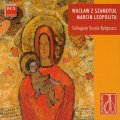Marcin Leopolita

Users contributing to this page: JanMalysiak
Biography
Marcin Leopolita (also Marcin z Lwowa; Lwów, now Lviv, Ukraine, 1537 – ca. 1584) was one of the most eminent Polish composers of the sixteenth century. He attended the Kraków University (Collegium Maius) and may have studied under Sebastian z Felsztyna and/or Jan Jelen of Tuchola. By the age of 20 he was already a member of the royal music ensemble at the court of King Zygmunt August, apparently becoming court composer there in 1560.
Only a few compositions of Leopolita survive today. Four Latin motets (Cibavit eos, Mihi autem, Resurgente Christo and Spiritus Domini) are preserved only in organ tablature, and of these only Cibavit Eos can be restored with confidence to its original vocal form. All four of these works are known from a single source: a tablature formerly belonging to the Warsaw Musicological Society which now only survives as a photographic copy, the original having been destroyed during World War Two. This tablature was probably written around 1580 and has been known as the Tablature of Martin Leopolita, although while Leopolita himself was indeed an organist his connection with the manuscript is uncertain.
Leopolita's five-part mass Missa paschalis is the only sixteenth-century Polish mass to survive intact, and the Agnus Dei, which adds a sixth voice (a second Cantus) has the distinction of being the earliest extant example of six-part Polish polyphony. It is based on themes from four Polish vernacular Easter songs (hence the designation 'Paschalis') of which Chrystus Pan zmartwychwstał is the most prominent.
Appeared on:
Comments:
Log in to leave a comment.



